You are here
New Releases
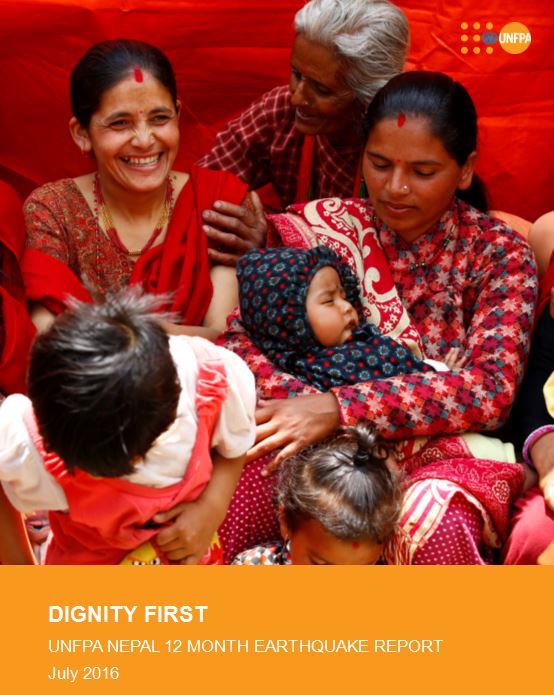
Dignity First: Nepal Earthquake One Year Report
2015 saw a lot of devastation, loss of lives and hardship. Over the past year, so much work has been done to help the country emerge and recover. We all saw how empowered young people continue to play a key role in the recovery efforts. We also saw how and why the dignity and special needs of women and girls should be prioritized at all times, including when a disaster strikes. It doesn’t stop there. We must continue to protect and uphold the dignity of women and girls every day. This one year report (April 2015-April 2016) — Dignity First — is about what services and support were provided to earthquake-affected people, particularly to address the sexual and reproductive health needs of women and girls as well as prevent and respond to gender-based violence. It’s also about the key lessons we learned from the earthquake. This report is the result of strong leadership from the Government of Nepal, generous support from many development partners and great support and collaboration from many implementing agencies and partners as well as young people. UNFPA, the United Nations Population Fund, is truly grateful to all of them. UNFPA Nepal looks forward to a continued collaboration with the government, parliamentarians, donors, partner organizations, civil society and young people to support Nepal to stay resilient.
National Strategy on Ending Child Marriage
सन् २०३० सम्म नेपालबाट बालविवाह अन्त्य गर्ने लक्ष्यसहित नेपाल सरकारले बालविवाह अन्त्यका लागि राष्ट्रिय रणनीति २०७२ जारी गरेको हो । नेपालको कानुनले २० वर्ष पूरा गरेपछि मात्र विवाहका लागि योग्य मानिएको भनिए पनि अझै २९ प्रतिशतको विवाह १८ वर्ष नपुग्दै हुने गरेको छ । किशोरकिशोरीसँग सम्बन्धित सबै मुद्दा सम्बोधन गर्न र बालविवाह अन्त्यका लागि कानुन कार्यान्वयन गर्न यस रणनीतिले प्रभावकारी भूमिका निर्वाह गर्नेछ भन्ने अपेक्षा यूएनएफपीए राख्दछ ।
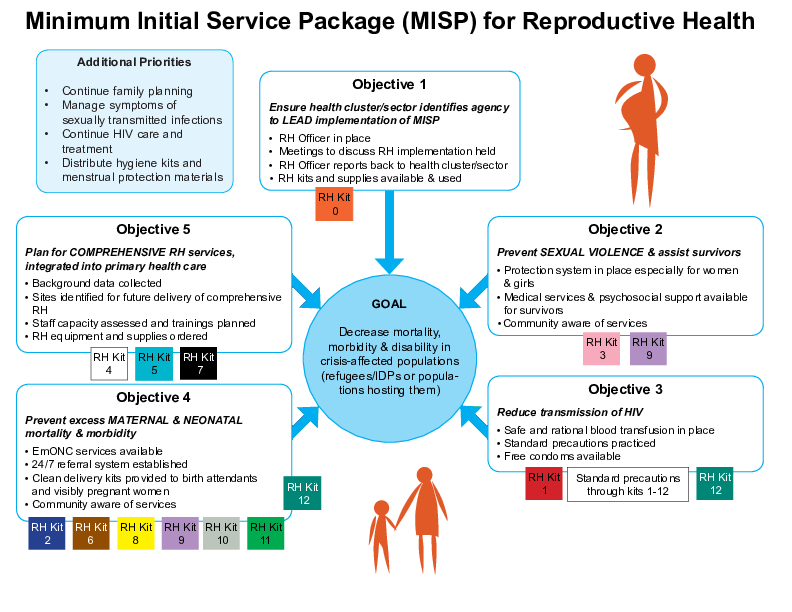
Minimum Initial Service Package for Reproductive Health Cheat Sheet
This Minimum Initial Service Package (MISP) cheat sheet provides a summary of MISP package for sexual and reproductive health (SRH) in emergency situations. It has been developed to help humanitarian workers, health workers, SRH coordinators and other stakeholders in Nepal to fulfill the reproductive health needs of the affected populations in an emergency setting.
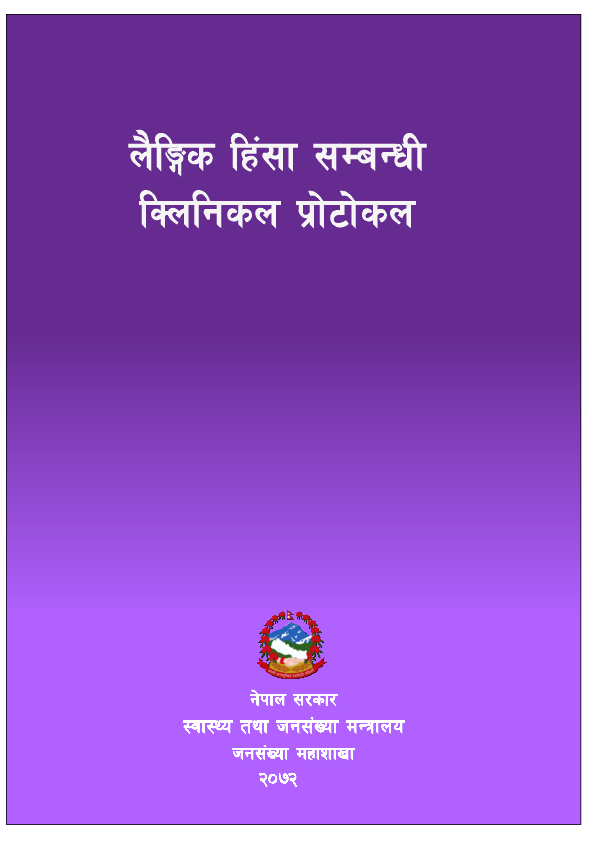
Clinical Protocol on Gender-Based Violence
This protocol in Nepali is the first national guideline for healthcare providers on management of gender-based violence (GBV) in Nepal. It aims at equipping health service providers with the best possible care to GBV survivors and empowering them to identify GBV survivors, manage cases and make appropriate referrals.
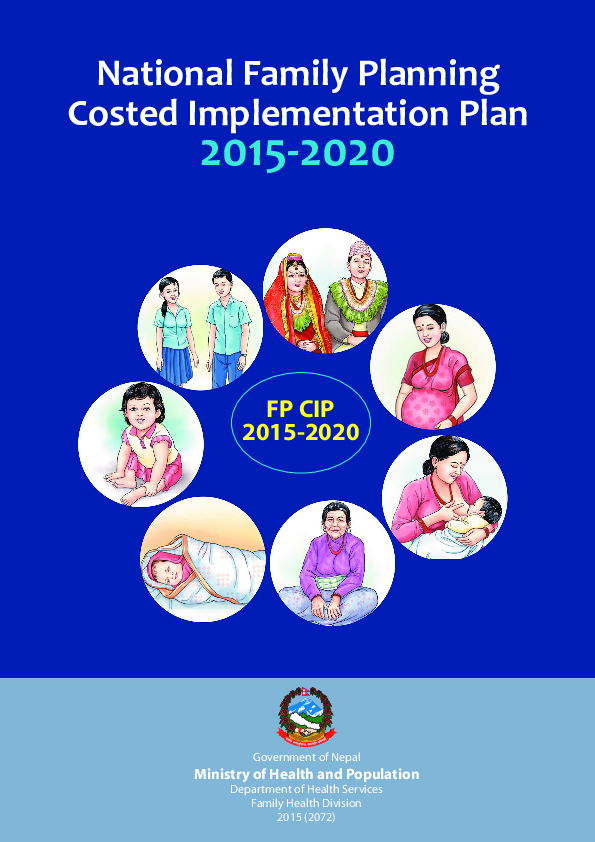
National Family Planning Costed Implementation Plan 2015-2020
This National Family Planning Costed Implementation Plan outlines national strategies and interventions that Nepal must adopt to ensure that high quality family planning services are available and accessible to all Nepali people as well as the resources reqired to realize this vision. This document is prepared by the Family Health Division under the Ministry of Health with technical and financial support of UNFPA, the United Nations Population Fund.
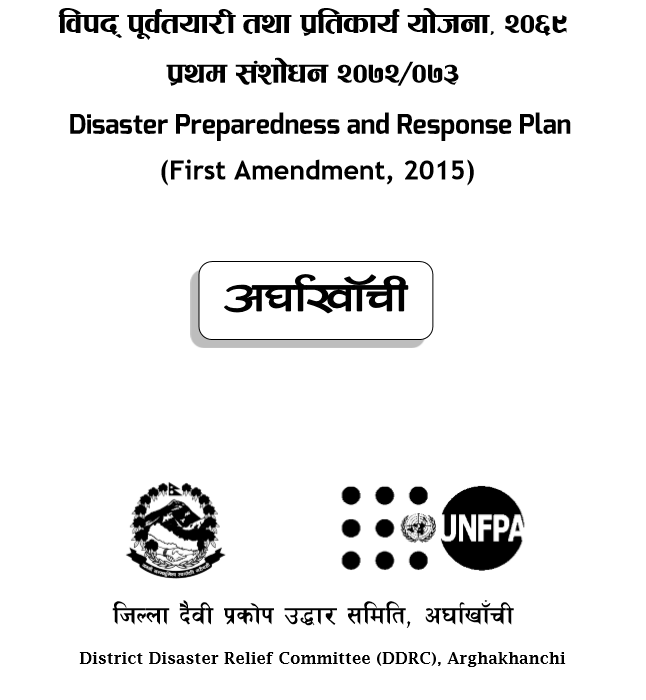
District Disaster Preparedness and Response Plan, Arghakhanchi
This District Disaster Preparedness and Response Plan for 2015 (अर्घाखाँची जिल्लाको विपद् पूर्वतयारी तथा प्रतिकार्य योजना (२०७२-२०७३) is a vulnerability assessment of Arghakhanchi district that incorporates components of Minimum Initial Service Package (MISP) for reproductive health in emergencies. This plan (in Nepali) has been prepared by District Disaster Relief Committee (DDRC), Dang, with technical support of UNFPA, the United Nations Population Fund.
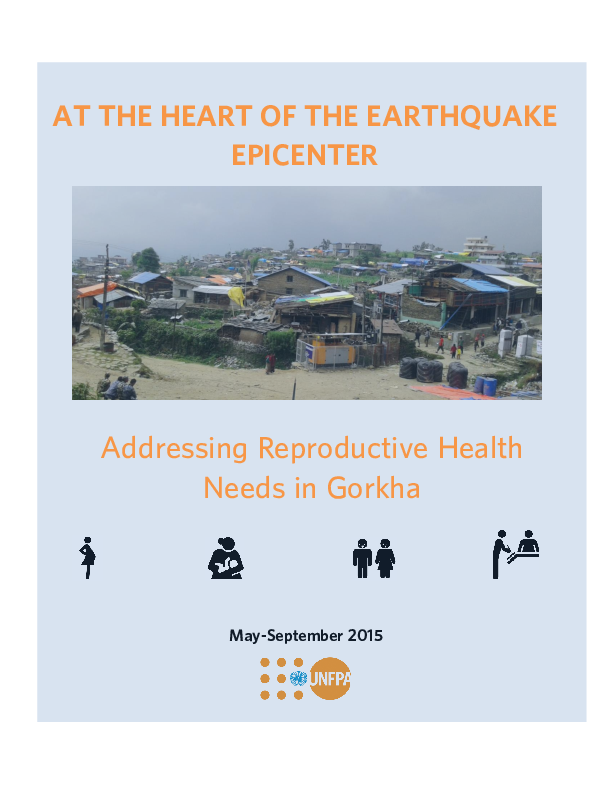
At the Heart of the Earthquake Epicenter
This document covers UNFPA's response to the devastating earthquake in Gorkha district, the epicenter of the April 25 disaster in Nepal, during the first five months.
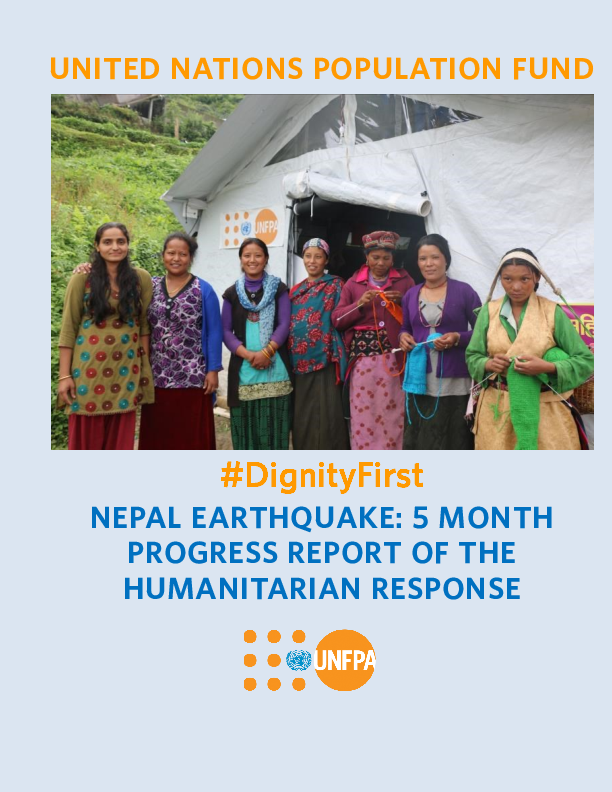
Nepal Earthquake: 5 Month Progress Report of the Humanatarian Responses
This report covers UNFPA's response to the devastating earthquake in the 14 most affected districts of Nepal during the first five months.
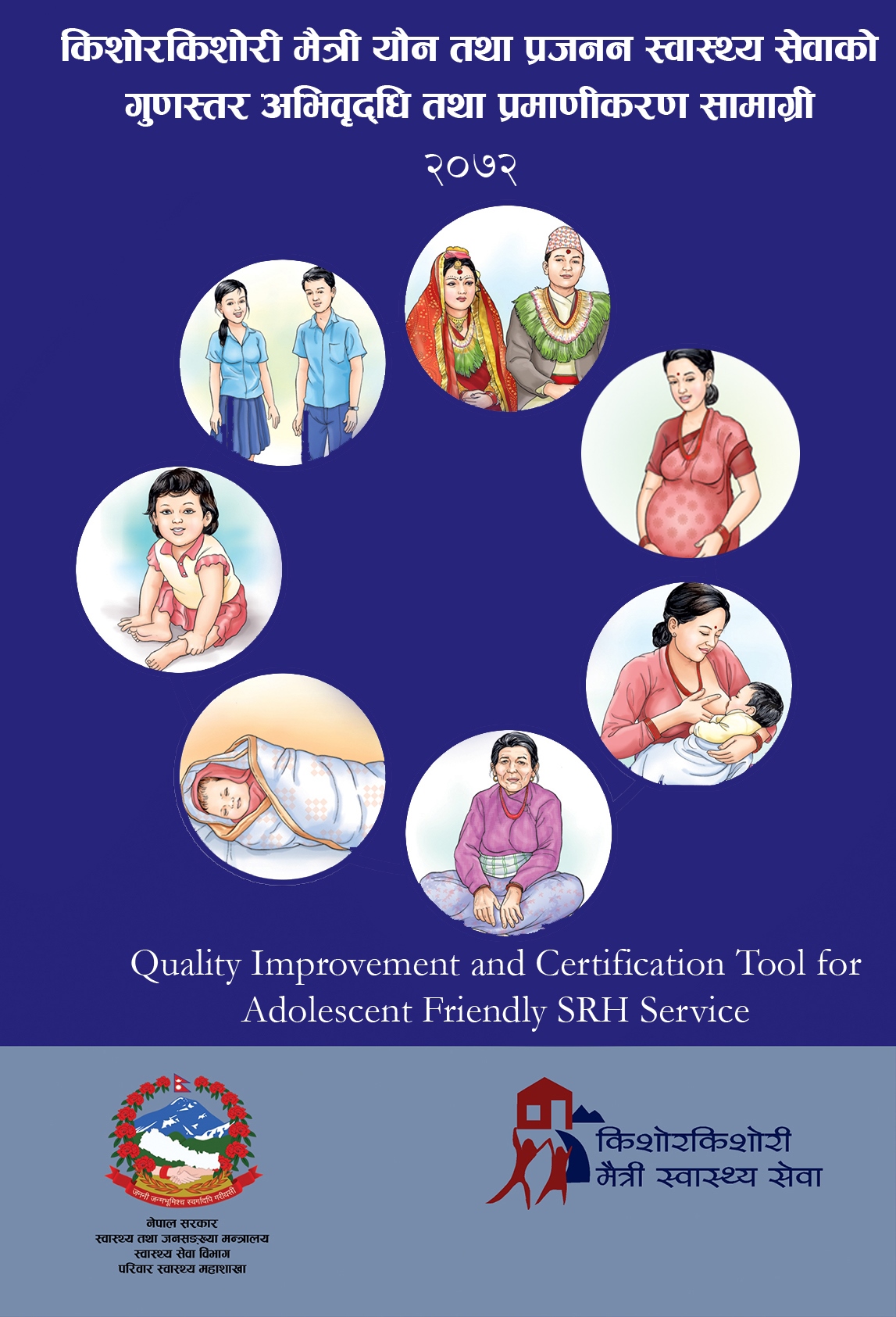
Quality Improvement and Certification Tool for Adolescent Friendly SRH Services
उच्च गुणस्तरीय किशोर-किशोरी मैत्री स्वास्थ्य सेवा प्रदान गर्नका लागि विभिन्न विशेषज्ञहरू, सरकारी अधिकारीहरू र किशोर किशोरीहरूलाई किशोर किशोरी मैत्री स्वास्थ्य सेवा प्रदान गरिरहेका स्वास्थ्यकर्मीहरूको सहयोग र राष्ट्रिय किशोर किशोरी यौन तथा प्रजनन स्वास्थ्य कार्यक्रम सञ्चालन निर्देशिका २०६८ (२०११) को मार्ग निर्देशमा रहेर यो किशोर किशोरी मैत्री स्वास्थ्य सेवाको गुणस्तर प्रमाणीकरणका आधारहरू र गुणस्तर अनुगमन सामग्री (Certification Criteria and Quality Assessment Tool) परिवार स्वास्थ्य महाशाखाले यूएनएफपीएको सहयाेगमा विकास गरिकाे हो । यो सामग्री विकास गर्नुको मुख्य उद्देश्य नेपाल सरकारका स्वास्थ्य संस्थाहरूमा उच्च गुणस्तरको किशोर किशोरी मैत्री स्वास्थ्य सेवाको उपलब्धता र निरन्तरताको सुनिश्चितता गर्नु हो ।
यो किशोर-किशोरी मैत्री स्वास्थ्य सेवाको प्रमाणीकरण तथा गुणस्तर अभिवृद्धि सामग्री स्वास्थ्य संस्थामा किशोर-किशोरी मैत्री स्वास्थ्य सेवाको अवस्थाको प्रमाणीकरण गर्दा सेवाको गुणस्तरको परिमाण तोक्ने साधन हो । यसलाई किशोर किशोरी मैत्री स्वास्थ्य सेवा सुरु गर्दा आधाररेखा (Baseline) का रूपमा रहेको आँकडा (अवस्था) सँग हालको प्रगतिलाई तुलना गर्नका लागि पनि प्रयोग गर्न सकिने छ ।
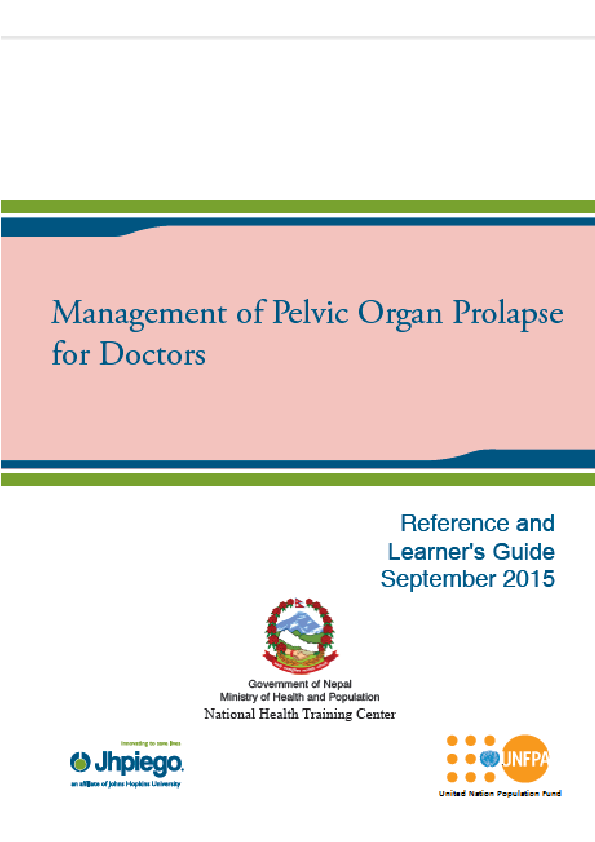
Management of Pelvic Organ Prolapse for Doctors: Reference and Learners' Guide
Pelvic organ prolapse (POP) is a significant reproductive morbidity among postmenopausal and women of reproductive age in Nepal. An estimated 600,000 women are suffering from varying degrees of POP (also called uterine prolapse or fallen womb). In the absence of a competency-based training package on POP, health service providers previously did not have standards for performing surgeries and were relying on anecdotal reports, compromising on the quality of care. With the training package, service providers are now expected to have comprehensive knowledge about this condition that affects many adult women today on how to provide quality care.This Facilitators' Guide is developed by the Ministry of Health and Population with technical and financial assistance from UNFPA, the United Nations Population Fund, and also with Jhpiego's technical support.